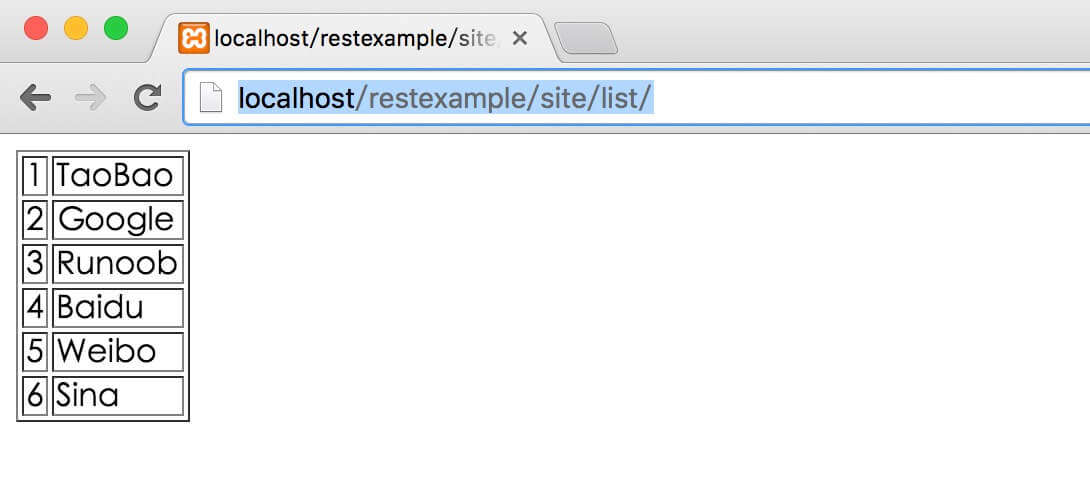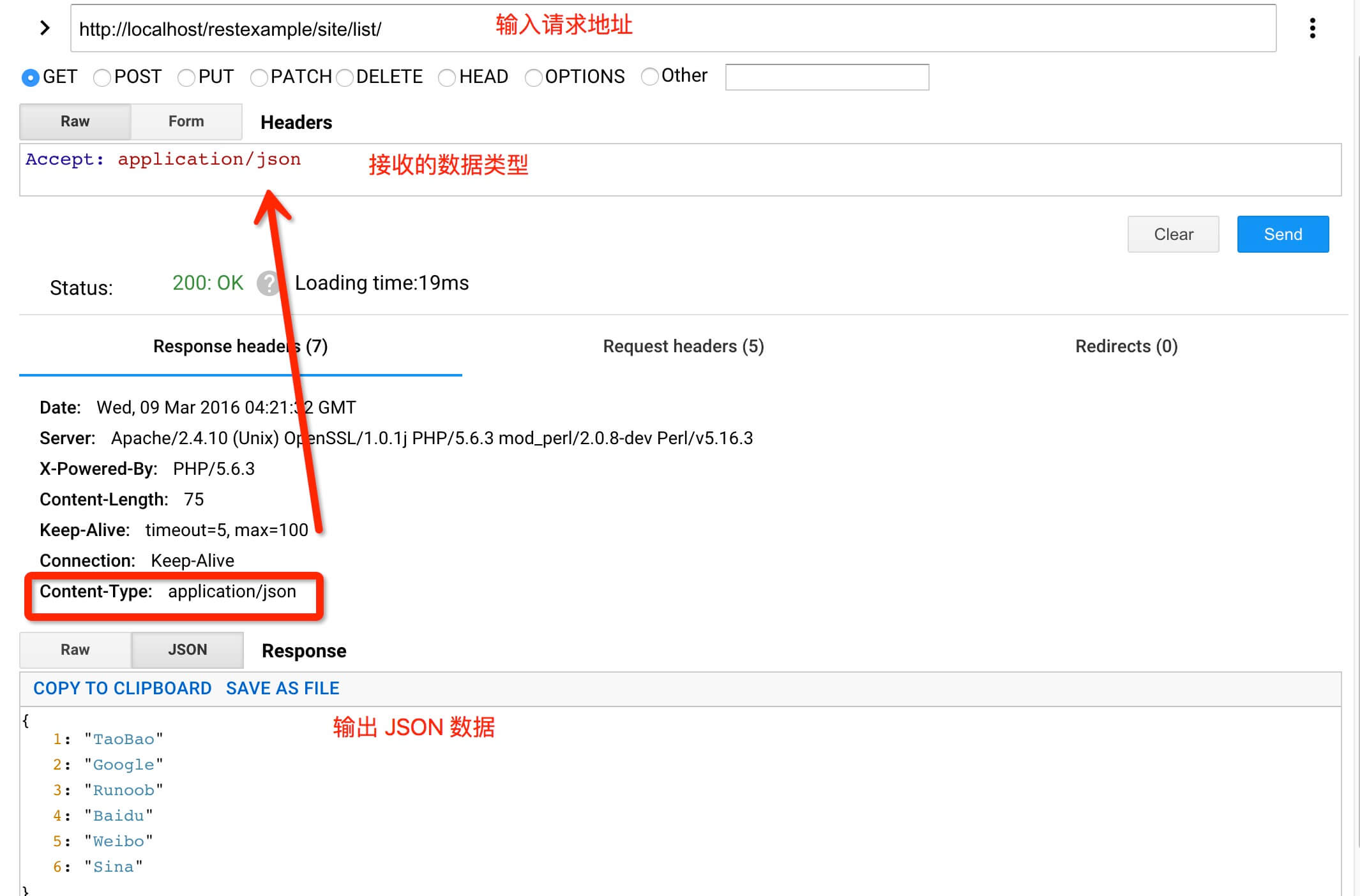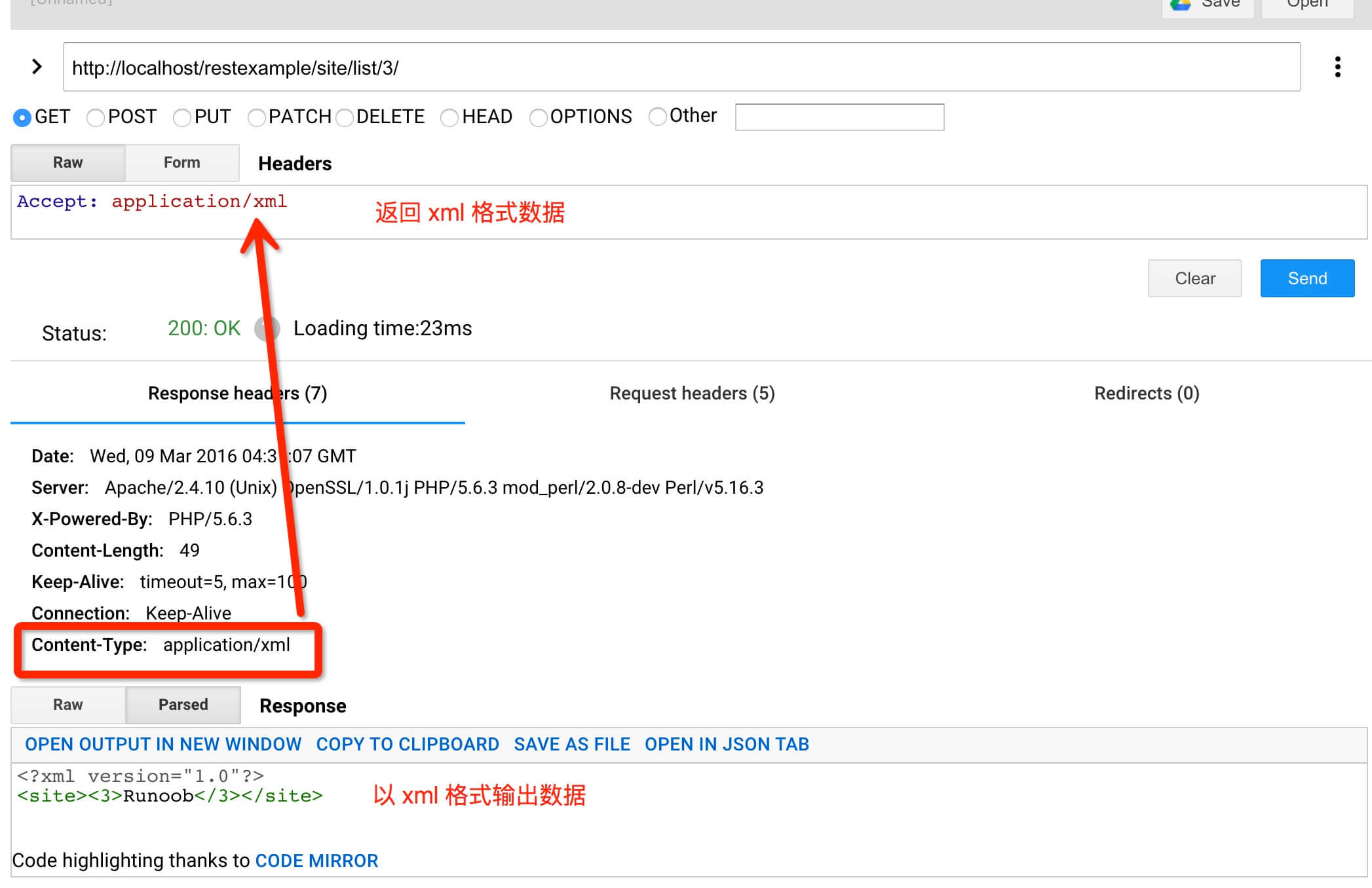REST(英文:Representational State Transfer,简称REST) ,指的是一组架构约束条件和原则。
符合REST设计风格的Web API称为RESTful API。它从以下三个方面资源进行定义:
- 直观简短的资源地址:URI,比如:
http://example.com/resources/。
- 传输的资源:Web服务接受与返回的互联网媒体类型,比如:JSON,XML,YAM等。
- 对资源的操作:Web服务在该资源上所支持的一系列请求方法(比如:POST,GET,PUT或DELETE)。
本教程我们将使用 PHP(不用框架) 来创建一个 RESTful web service,在文章末尾你可以下载本章节使用到的代码。
通过本教程你将学习到以下内容:
- 创建一个 RESTful Webservice。
- 使用原生 PHP, 不依赖任何框架。
- URI 模式需要遵循 REST 规则。
- RESTful service 接受与返回的格式可以是 JSON, XML等。
- 根据不同情况响应对应的 HTTP 状态码。
- 演示请求头的使用。
- 使用 REST 客户端来测试 RESTful web service。
RESTful Webservice 实例
以下代码是 RESTful 服务类 Site.php:
实例
<?php
Class
Site
{
private
$sites
=
array
(
1
=>
'
TaoBao
'
,
2
=>
'
Google
'
,
3
=>
'
Voidme
'
,
4
=>
'
Baidu
'
,
5
=>
'
Weibo
'
,
6
=>
'
Sina
'
)
;
public
function
getAllSite
(
)
{
return
$this
->
sites
;
}
public
function
getSite
(
$id
)
{
$site
=
array
(
$id
=>
(
$this
->
sites
[
$id
]
)
?
$this
->
sites
[
$id
]
:
$this
->
sites
[
1
]
)
;
return
$site
;
}
}
?>
RESTful Services URI 映射
RESTful Services URI 应该设置为一个直观简短的资源地址。Apache 服务器的 .htaccess 应设置好对应的 Rewrite 规则。
本实例我们将使用两个 URI 规则:
1、获取所有站点列表:
http://localhost/restexample/site/list/
2、使用 id 获取指定的站点,以下 URI 为获取 id 为 3 的站点:
http://localhost/restexample/site/list/3/
项目的 .htaccess 文件配置规则如下所示:
# 开启 rewrite 功能
Options +FollowSymlinks
RewriteEngine on
# 重写规则
RewriteRule ^site/list/$ RestController.php?view=all [nc,qsa]
RewriteRule ^site/list/([0-9]+)/$ RestController.php?view=single&id=$1 [nc,qsa]
RESTful Web Service 控制器
在 .htaccess 文件中,我们通过设置参数 'view' 来获取 RestController.php 文件中对应的请求,通过获取 'view' 不同的参数来分发到不同的方法上。RestController.php 文件代码如下:
实例
<?php
require_once
(
"
SiteRestHandler.php
"
)
;
$view
=
"
"
;
if
(
isset
(
$_GET
[
"
view
"
]
)
)
$view
=
$_GET
[
"
view
"
]
;
switch
(
$view
)
{
case
"
all
"
:
$siteRestHandler
=
new
SiteRestHandler
(
)
;
$siteRestHandler
->
getAllSites
(
)
;
break
;
case
"
single
"
:
$siteRestHandler
=
new
SiteRestHandler
(
)
;
$siteRestHandler
->
getSite
(
$_GET
[
"
id
"
]
)
;
break
;
case
"
"
:
break
;
}
?>
简单的 RESTful 基础类
以下提供了 RESTful 的一个基类,用于处理响应请求的 HTTP 状态码,SimpleRest.php 文件代码如下:
实例
<?php
class
SimpleRest
{
private
$httpVersion
=
"
HTTP/1.1
"
;
public
function
setHttpHeaders
(
$contentType
,
$statusCode
)
{
$statusMessage
=
$this
->
getHttpStatusMessage
(
$statusCode
)
;
header
(
$this
->
httpVersion
.
"
"
.
$statusCode
.
"
"
.
$statusMessage
)
;
header
(
"
Content-Type:
"
.
$contentType
)
;
}
public
function
getHttpStatusMessage
(
$statusCode
)
{
$httpStatus
=
array
(
100
=>
'
Continue
'
,
101
=>
'
Switching Protocols
'
,
200
=>
'
OK
'
,
201
=>
'
Created
'
,
202
=>
'
Accepted
'
,
203
=>
'
Non-Authoritative Information
'
,
204
=>
'
No Content
'
,
205
=>
'
Reset Content
'
,
206
=>
'
Partial Content
'
,
300
=>
'
Multiple Choices
'
,
301
=>
'
Moved Permanently
'
,
302
=>
'
Found
'
,
303
=>
'
See Other
'
,
304
=>
'
Not Modified
'
,
305
=>
'
Use Proxy
'
,
306
=>
'
(Unused)
'
,
307
=>
'
Temporary Redirect
'
,
400
=>
'
Bad Request
'
,
401
=>
'
Unauthorized
'
,
402
=>
'
Payment Required
'
,
403
=>
'
Forbidden
'
,
404
=>
'
Not Found
'
,
405
=>
'
Method Not Allowed
'
,
406
=>
'
Not Acceptable
'
,
407
=>
'
Proxy Authentication Required
'
,
408
=>
'
Request Timeout
'
,
409
=>
'
Conflict
'
,
410
=>
'
Gone
'
,
411
=>
'
Length Required
'
,
412
=>
'
Precondition Failed
'
,
413
=>
'
Request Entity Too Large
'
,
414
=>
'
Request-URI Too Long
'
,
415
=>
'
Unsupported Media Type
'
,
416
=>
'
Requested Range Not Satisfiable
'
,
417
=>
'
Expectation Failed
'
,
500
=>
'
Internal Server Error
'
,
501
=>
'
Not Implemented
'
,
502
=>
'
Bad Gateway
'
,
503
=>
'
Service Unavailable
'
,
504
=>
'
Gateway Timeout
'
,
505
=>
'
HTTP Version Not Supported
'
)
;
return
(
$httpStatus
[
$statusCode
]
)
?
$httpStatus
[
$statusCode
]
:
$status
[
500
]
;
}
}
?>
RESTful Web Service 处理类
以下是一个 RESTful Web Service 处理类 SiteRestHandler.php,继承了上面我们提供的 RESTful 基类,类中通过判断请求的参数来决定返回的 HTTP 状态码及数据格式,实例中我们提供了三种数据格式: "application/json" 、 "application/xml" 或 "text/html":
SiteRestHandler.php 文件代码如下:
实例
<?php
require_once
(
"
SimpleRest.php
"
)
;
require_once
(
"
Site.php
"
)
;
class
SiteRestHandler
extends
SimpleRest
{
function
getAllSites
(
)
{
$site
=
new
Site
(
)
;
$rawData
=
$site
->
getAllSite
(
)
;
if
(
empty
(
$rawData
)
)
{
$statusCode
=
404
;
$rawData
=
array
(
'
error
'
=>
'
No sites found!
'
)
;
}
else
{
$statusCode
=
200
;
}
$requestContentType
=
$_SERVER
[
'
HTTP_ACCEPT
'
]
;
$this
->
setHttpHeaders
(
$requestContentType
,
$statusCode
)
;
if
(
strpos
(
$requestContentType
,
'
application/json
'
)
!==
false
)
{
$response
=
$this
->
encodeJson
(
$rawData
)
;
echo
$response
;
}
else
if
(
strpos
(
$requestContentType
,
'
text/html
'
)
!==
false
)
{
$response
=
$this
->
encodeHtml
(
$rawData
)
;
echo
$response
;
}
else
if
(
strpos
(
$requestContentType
,
'
application/xml
'
)
!==
false
)
{
$response
=
$this
->
encodeXml
(
$rawData
)
;
echo
$response
;
}
}
public
function
encodeHtml
(
$responseData
)
{
$htmlResponse
=
"
<table border='1'>
"
;
foreach
(
$responseData
as
$key
=>
$value
)
{
$htmlResponse
.=
"
<tr><td>
"
.
$key
.
"
</td><td>
"
.
$value
.
"
</td></tr>
"
;
}
$htmlResponse
.=
"
</table>
"
;
return
$htmlResponse
;
}
public
function
encodeJson
(
$responseData
)
{
$jsonResponse
=
json_encode
(
$responseData
)
;
return
$jsonResponse
;
}
public
function
encodeXml
(
$responseData
)
{
$xml
=
new
SimpleXMLElement
(
'
<?xml version="1.0"?><site></site>
'
)
;
foreach
(
$responseData
as
$key
=>
$value
)
{
$xml
->
addChild
(
$key
,
$value
)
;
}
return
$xml
->
asXML
(
)
;
}
public
function
getSite
(
$id
)
{
$site
=
new
Site
(
)
;
$rawData
=
$site
->
getSite
(
$id
)
;
if
(
empty
(
$rawData
)
)
{
$statusCode
=
404
;
$rawData
=
array
(
'
error
'
=>
'
No sites found!
'
)
;
}
else
{
$statusCode
=
200
;
}
$requestContentType
=
$_SERVER
[
'
HTTP_ACCEPT
'
]
;
$this
->
setHttpHeaders
(
$requestContentType
,
$statusCode
)
;
if
(
strpos
(
$requestContentType
,
'
application/json
'
)
!==
false
)
{
$response
=
$this
->
encodeJson
(
$rawData
)
;
echo
$response
;
}
else
if
(
strpos
(
$requestContentType
,
'
text/html
'
)
!==
false
)
{
$response
=
$this
->
encodeHtml
(
$rawData
)
;
echo
$response
;
}
else
if
(
strpos
(
$requestContentType
,
'
application/xml
'
)
!==
false
)
{
$response
=
$this
->
encodeXml
(
$rawData
)
;
echo
$response
;
}
}
}
?>
接下来我们通过 http://localhost/restexample/site/list/ 访问,输出结果如下:

RESTful Web Service 客户端
接下来我们可以使用 Google Chrome 浏览器的 "Advance Rest Client" 作为 RESTful Web Service 客户端来请求我们的服务。
实例中请求 http://localhost/restexample/site/list/ 地址,接收数据类似为 Accept: application/json

请求 id 为 3 的站点 Voidme(小白教程),访问地址为 http://localhost/restexample/site/list/3/,

源码下载
实例中使用到的代码可点击以下按钮下载:
源码下载


